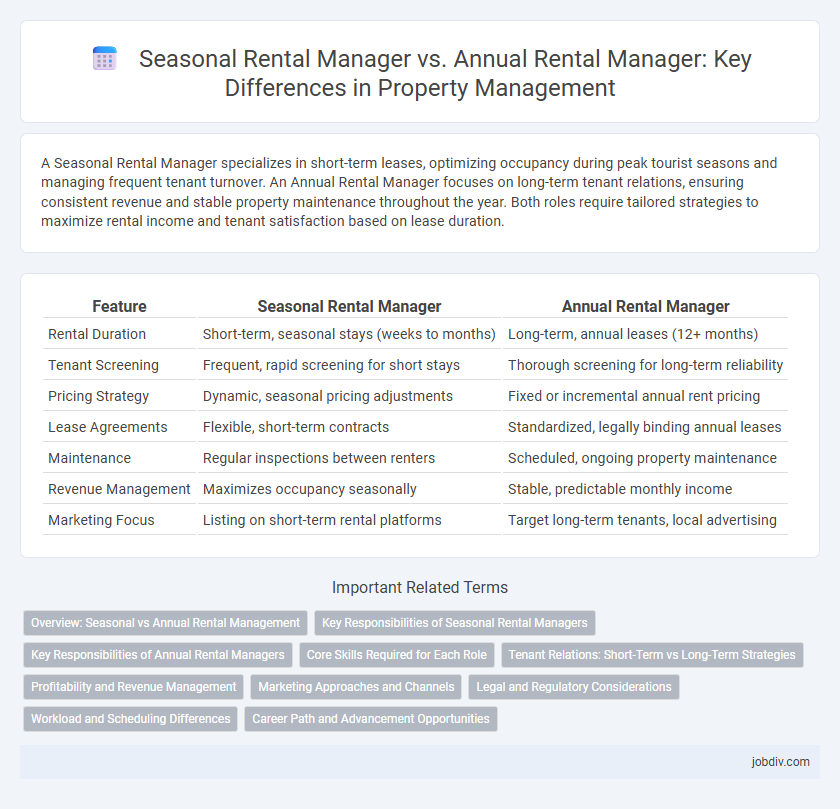A Seasonal Rental Manager specializes in short-term leases, optimizing occupancy during peak tourist seasons and managing frequent tenant turnover. An Annual Rental Manager focuses on long-term tenant relations, ensuring consistent revenue and stable property maintenance throughout the year. Both roles require tailored strategies to maximize rental income and tenant satisfaction based on lease duration.
Table of Comparison
| Feature | Seasonal Rental Manager | Annual Rental Manager |
|---|---|---|
| Rental Duration | Short-term, seasonal stays (weeks to months) | Long-term, annual leases (12+ months) |
| Tenant Screening | Frequent, rapid screening for short stays | Thorough screening for long-term reliability |
| Pricing Strategy | Dynamic, seasonal pricing adjustments | Fixed or incremental annual rent pricing |
| Lease Agreements | Flexible, short-term contracts | Standardized, legally binding annual leases |
| Maintenance | Regular inspections between renters | Scheduled, ongoing property maintenance |
| Revenue Management | Maximizes occupancy seasonally | Stable, predictable monthly income |
| Marketing Focus | Listing on short-term rental platforms | Target long-term tenants, local advertising |
Overview: Seasonal vs Annual Rental Management
Seasonal rental managers specialize in short-term property leases, optimizing occupancy during high-demand periods such as holidays or vacation seasons. Annual rental managers handle long-term leases, focusing on tenant retention, consistent rent collection, and property maintenance over extended periods. Effective management strategies vary significantly due to differences in tenant turnover rates, marketing approaches, and regulatory considerations between seasonal and annual rentals.
Key Responsibilities of Seasonal Rental Managers
Seasonal Rental Managers specialize in managing short-term rental properties, focusing on tasks such as coordinating check-ins and check-outs, handling guest inquiries, and ensuring property maintenance aligns with peak occupancy periods. They optimize occupancy rates by adjusting pricing dynamically based on demand trends during high-season windows. Their role also involves marketing properties on multiple platforms and maintaining strong relationships with cleaning and maintenance teams to ensure seamless guest experiences.
Key Responsibilities of Annual Rental Managers
Annual Rental Managers oversee long-term lease agreements, ensuring tenant retention through consistent property maintenance and prompt resolution of tenant issues. They manage rent collection, enforce lease terms, and coordinate property inspections to minimize vacancy rates. Strategic budgeting and compliance with landlord-tenant laws are essential responsibilities for Annual Rental Managers to optimize rental income.
Core Skills Required for Each Role
Seasonal Rental Managers require expertise in short-term pricing strategies, peak demand forecasting, and rapid tenant turnover management to maximize occupancy during high-demand periods. Annual Rental Managers focus on long-term lease negotiations, tenant relationship maintenance, and consistent rent collection to ensure steady income and property stability. Both roles demand strong communication and problem-solving skills, but the seasonal role emphasizes adaptability, while the annual role prioritizes contract management and tenant retention.
Tenant Relations: Short-Term vs Long-Term Strategies
Seasonal Rental Managers prioritize tenant relations through frequent turnover management, guest satisfaction, and rapid response to short-term tenant needs, enhancing occupancy rates during peak seasons. Annual Rental Managers focus on building long-term tenant trust, consistent communication, and proactive maintenance to ensure lease renewals and stable income streams. Effective strategies for Seasonal Rentals include guest reviews and flexible policies, while Annual Rentals benefit from personalized service and community engagement.
Profitability and Revenue Management
Seasonal Rental Managers maximize profitability through dynamic pricing strategies tailored to peak demand periods, leveraging fluctuations in occupancy rates for higher revenue per available unit. Annual Rental Managers focus on steady cash flow and long-term tenant retention, optimizing profitability by minimizing vacancies and maintenance costs over extended contracts. Effective revenue management for seasonal rentals involves more complex forecasting and market analysis, while annual rentals prioritize consistent income stability.
Marketing Approaches and Channels
Seasonal Rental Managers concentrate marketing efforts on short-term travelers through platforms like Airbnb, VRBO, and social media campaigns targeting vacationers, enhancing visibility during peak seasons. Annual Rental Managers utilize long-term advertising channels such as local classifieds, property management websites, and partnerships with relocation agencies to attract stable, long-term tenants. Both leverage SEO-optimized listings and targeted email marketing but differ significantly in campaign duration and audience segmentation.
Legal and Regulatory Considerations
Seasonal Rental Managers must navigate complex short-term rental regulations, including transient occupancy taxes and licensing requirements that vary by jurisdiction. Annual Rental Managers focus primarily on long-term lease agreements governed by landlord-tenant laws, eviction protections, and rent control ordinances. Both roles require compliance with local housing codes, but seasonal rentals often face stricter zoning restrictions and more frequent inspections due to higher tenant turnover.
Workload and Scheduling Differences
Seasonal rental managers handle fluctuating workloads concentrated during peak vacation months, requiring flexible scheduling to accommodate high guest turnover and property maintenance between stays. Annual rental managers maintain a steadier workload year-round, focusing on long-term tenant relations, lease renewals, and routine property inspections, enabling more predictable schedules. The varying demands impact staffing needs and operational strategies, with seasonal managers often managing multiple properties simultaneously, while annual managers focus on sustained tenant satisfaction and lease compliance.
Career Path and Advancement Opportunities
Seasonal Rental Managers often gain diverse skills in short-term property management, making them valuable for high-turnover markets but may face limited long-term career advancement due to contract constraints. Annual Rental Managers typically develop expertise in sustained tenant relationships and property maintenance, positioning them for stable roles with clearer pathways to senior management or property director roles. Transitioning from seasonal to annual management can broaden career prospects, combining adaptability with deep operational knowledge.
Seasonal Rental Manager vs Annual Rental Manager Infographic

 jobdiv.com
jobdiv.com